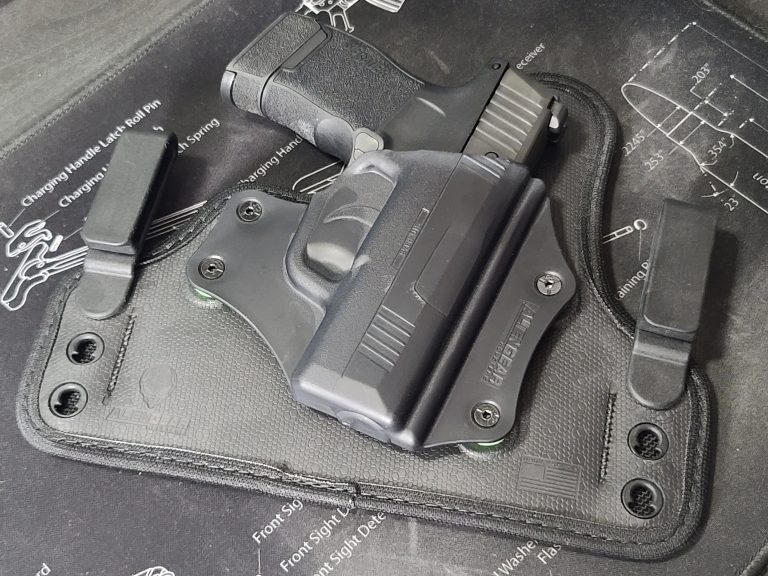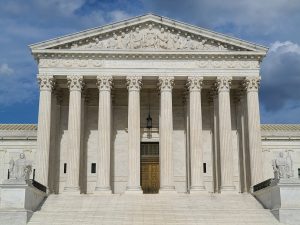After the Supreme Court ruled New York’s “proper cause” standard for issuing gun carry permits was unconstitutional last month, the half-dozen states with similar standards identified by the Court are starting to respond.
While some states were quick to renounce their respective “proper cause” standards, others have chosen to take a more antagonistic approach and add new restrictive standards designed to blunt the effect of the Court’s ruling. Still, others have chosen to do nothing at all, channeling former President Andrew Jackson who famously said, “John Marshall has made his decision, now let him enforce it” in defiance of a landmark Supreme Court decision.
Here’s a rundown of where affected states have chosen to stand following the New York State Rifle and Pistol Association v. Bruen decision.
New York
Despite being the jurisdiction at issue in the Supreme Court’s ruling, New York has chosen to take the antagonistic approach to SCOTUS after having its licensing regime deemed unconstitutional. The state did scrub its gun carry law of the “proper cause” requirement at issue in Bruen, but it promptly doubled down on the equally subjective “good moral character” standard that relies on multiple personal references and even a review of an applicant’s social media.
It also chose to take an expansive view of what constitutes a “sensitive place,” allowing many restrictions on where a permitted individual can carry. The new law deems all government property, health care facilities, churches, schools, public transportation, protest locations, and all of Times Square “sensitive places” where licensed carry is criminally prohibited.
It also renders all private businesses presumptively off-limits for gun carry unless a business owner explicitly authorizes licensed carry on the premises.
The new law seems destined for yet another legal rebuke from the federal court system.
California
The nation’s most populous state has a similar concealed carry law to New York’s now invalidated statute, requiring an applicant to show “good cause” in order to be granted a permit.
Shortly after the Bruen decision, California Attorney General Rob Bonta (D.) sent out a notice to law enforcement agencies across the state informing them of necessary changes to the state’s gun permitting system.
“Effective immediately, issuing authorities should no longer require proof of good cause for the issuance of a public-carry license,” Bonta wrote. “Issuing authorities may still inquire into an applicant’s reasons for desiring a license to the extent those reasons are relevant to other lawful considerations, but denial of a license for lack of ‘good cause’ now violates the Second and Fourteenth Amendments under the Supreme Court’s decision in Bruen.”
However, the state does not appear to be content with the status of its carry regime. A new bill expected to pass and be signed by Governor Gavin Newsom (D.) would add hurdles to the state’s permit application process and add a wide range of “sensitive places” off-limits to licensed carry.
The bill would deem carry illegal on “all school grounds, college and university campuses, government and judicial buildings, medical facilities, public transit, public parks, playgrounds, public demonstrations and any place where alcohol is sold,” according to CalMatters.
Hawaii
So far, Hawaii, a state with one of the most restrictive applications of a “good reason” standard for carry permits, has refused to make any new changes to its law. Immediately following the Bruen decision, the Attorney General’s office issued a statement denouncing the ruling while remaining cagey about any forthcoming changes.
“We profoundly disagree with this decision,” the statement said. “We will carefully examine this decision and consider if it will affect our laws, which were not at issue in the Supreme Court case today.”
Likewise, the Honolulu Police Department put out a similar statement following the ruling:
“We are currently reviewing the ruling and are in discussion with the other county police departments,” the police said. “The HPD’s firearms permitting procedures are unchanged at this time but will be evaluated in light of the ruling.”
Despite the state’s refusal to take any action adjusting its carry permitting system, the Supreme Court has taken additional steps in the interim that may force its hand. It issued a grant, vacate, and remand order for Young v. Hawaii, a Ninth Circuit case centered around a Hawaii resident seeking to carry a gun in public for self-defense. Prior to the Bruen decision, the Ninth Circuit ruled in Young that the Second Amendment did not protect a right to carry a gun outside the home whatsoever. Now that the court is being forced to reconsider the case in light of the decision in Bruen, Hawaii will likely be forced to make changes that will allow law-abiding residents to receive permits.
New Jersey
New Jersey was one of the fastest moving states to bring its statute in compliance with the Bruen ruling. The day after the Court handed down its decision in the case, Attorney General Matthew Platkin (D.) issued a directive to law enforcement officials across the state informing them that the state’s “justifiable need” provision may no longer be enforced.
The state has since signed several additional gun-control bills but did not target carry rights directly.
Maryland
Governor Larry Hogan (R.) announced on Tuesday that he was directing state law enforcement agencies to comply with the Supreme Court’s ruling in Bruen by ending the state’s “good reason” requirement for permit issuance.
“Last month, the U.S. Supreme Court struck down a provision in New York law pertaining to handgun permitting that is virtually indistinguishable from Maryland law,” Hogan said in a press release. “In light of the ruling and to ensure compliance with the Constitution, I am directing the Maryland State Police to immediately suspend utilization of the ‘good and substantial reason’ standard when reviewing applications for Wear and Carry Permits. It would be unconstitutional to continue enforcing this provision in state law.”
The move is expected to dramatically increase the number of carry permits issued in the state, and demand for permits has already started to spike.
Massachusetts
Attorney General Maura Healey (D.) released a legal advisory last Friday to clarify how the state’s permitting system will change following the Supreme Court’s ruling.
“In light of Bruen’s holding that New York’s ‘proper cause’ requirement violates the Second and Fourteenth Amendments, licensing authorities should no longer enforce the… ‘good reason’ aspect of the license-to-carry statute, under which the applicant must identify a reason or reasons for obtaining a license, and the licensing authority may restrict the license upon determining that the applicant lacks a sufficiently good reason to fear injury to person or property,” Healey wrote.
However, Healey said determinations for granting licenses can still be made based on the “suitability” of a particular applicant.
“Licensing authorities also can and should continue to enforce the ‘prohibited person’ and the ‘suitability’ elements of the license-to-carry statute,” she wrote.
Suitability is determined based on whether or not “reliable and credible information” shows an applicant to be a risk to public safety.
Gun-rights groups in the state have compared this component to the invalidated “good reason” standard. The groups have demanded that the suitability requirement be retracted as well.
Even though five of the six states directly named in Bruen have taken steps to remove their “proper cause” requirements, it remains to be seen what the practical impacts will be for gun owners in each respective state. Further litigation is also quite likely, particularly in states like New York and California that proceed to take expansive views on location restrictions and application requirements as a substitute for discretionary permit issuing.
But, in the meantime, it appears that subjective “good cause” standards have been all but relegated to the dustbins of history.






